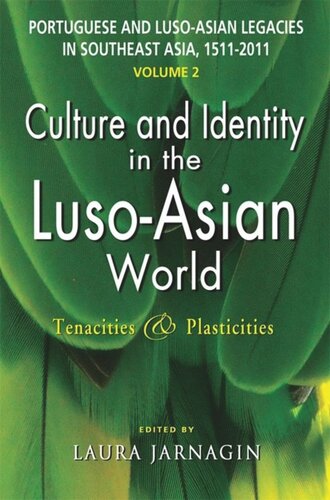

Most ebook files are in PDF format, so you can easily read them using various software such as Foxit Reader or directly on the Google Chrome browser.
Some ebook files are released by publishers in other formats such as .awz, .mobi, .epub, .fb2, etc. You may need to install specific software to read these formats on mobile/PC, such as Calibre.
Please read the tutorial at this link: https://ebookbell.com/faq
We offer FREE conversion to the popular formats you request; however, this may take some time. Therefore, right after payment, please email us, and we will try to provide the service as quickly as possible.
For some exceptional file formats or broken links (if any), please refrain from opening any disputes. Instead, email us first, and we will try to assist within a maximum of 6 hours.
EbookBell Team

4.0
76 reviews"In 1511, a Portuguese expedition under the command of Afonso de Albuquerque arrived on the shores of Malacca, taking control of the prosperous Malayan port-city after a swift military campaign. Portugal, a peripheral but then technologically advanced country in southwestern Europe since the latter fifteenth century, had been in the process of establishing solid outposts all along Asia's litoral in order to participate in the most active and profitable maritime trading routes of the day. As it turned out, the Portuguese presence and influence in the Malayan Peninsula and elsewhere in continental and insular Asia expanded far beyond the sphere of commerce and extended over time well into the twenty-first century. Five hundred years later, a conference held in Singapore brought together a large group of scholars from widely different national, academic and disciplinary contexts, to analyse and discuss the intricate consequences of Portuguese interactions in Asia over the longue durée. The result of these discussions is a stimulating set of case studies that, as a rule, combine original archival and/or field research with innovative historiographical perspectives. Luso-Asian communities, real and imagined, and Luso-Asian heritage, material and symbolic, are studied with depth and insight. The range of thematic, chronological and geographic areas covered in these proceeding is truly remarkable, showing not only the extraordinary relevance of revisiting Luso-Asian interactions in the longer term, but also the surprising dynamism within an area of studies which seemed on the verge of exhaustion. After all, archives from all over the world, from Rio de Janeiro to London, from Lisbon to Rome, and from Goa to Macao, might still hold some secrets on the subject of Luso-Asian relations, when duly explored by resourceful scholars." - Rui M. Loureiro, Centro de Historia de Alem-Mar, Lisbon "This two-volume set pulls together several interdisciplinary studies historicizing Portuguese 'legacies' across Asia over a period of approximately five centuries (ca. 1511-2011). It is especially recommended to readers interested in the broader aspects of the early European presence in Asia, and specifically on questions of politics, colonial administration, commerce, societal interaction, integration, identity, hybridity, religion and language." - Associate Professor Peter Borschberg, Department of History, National University of Singapore